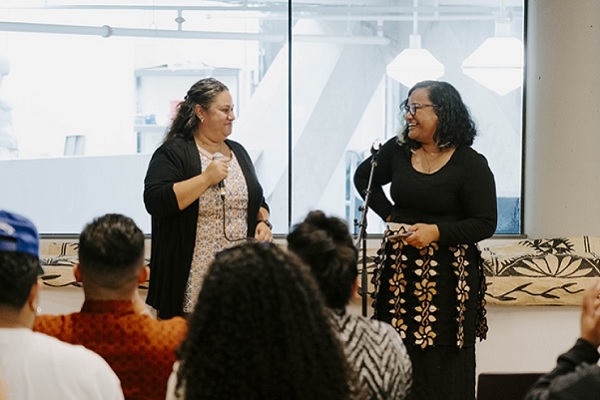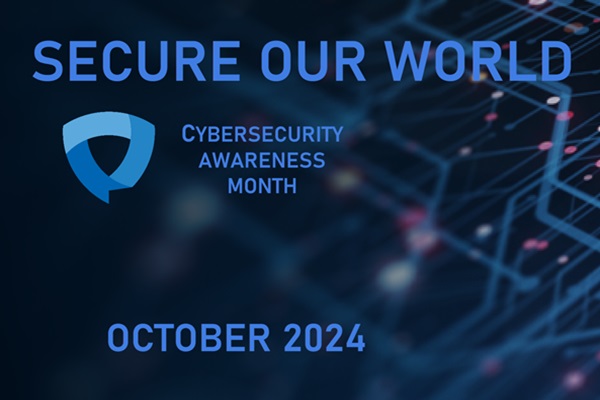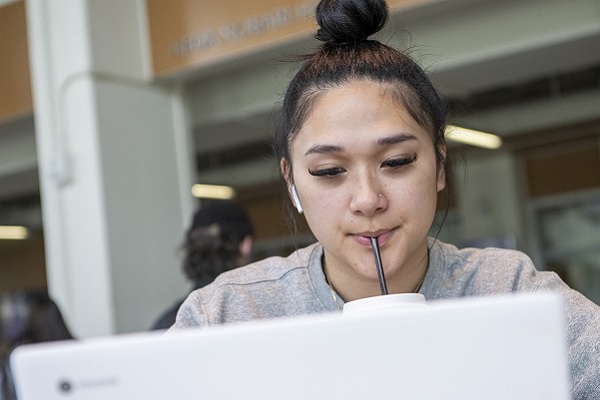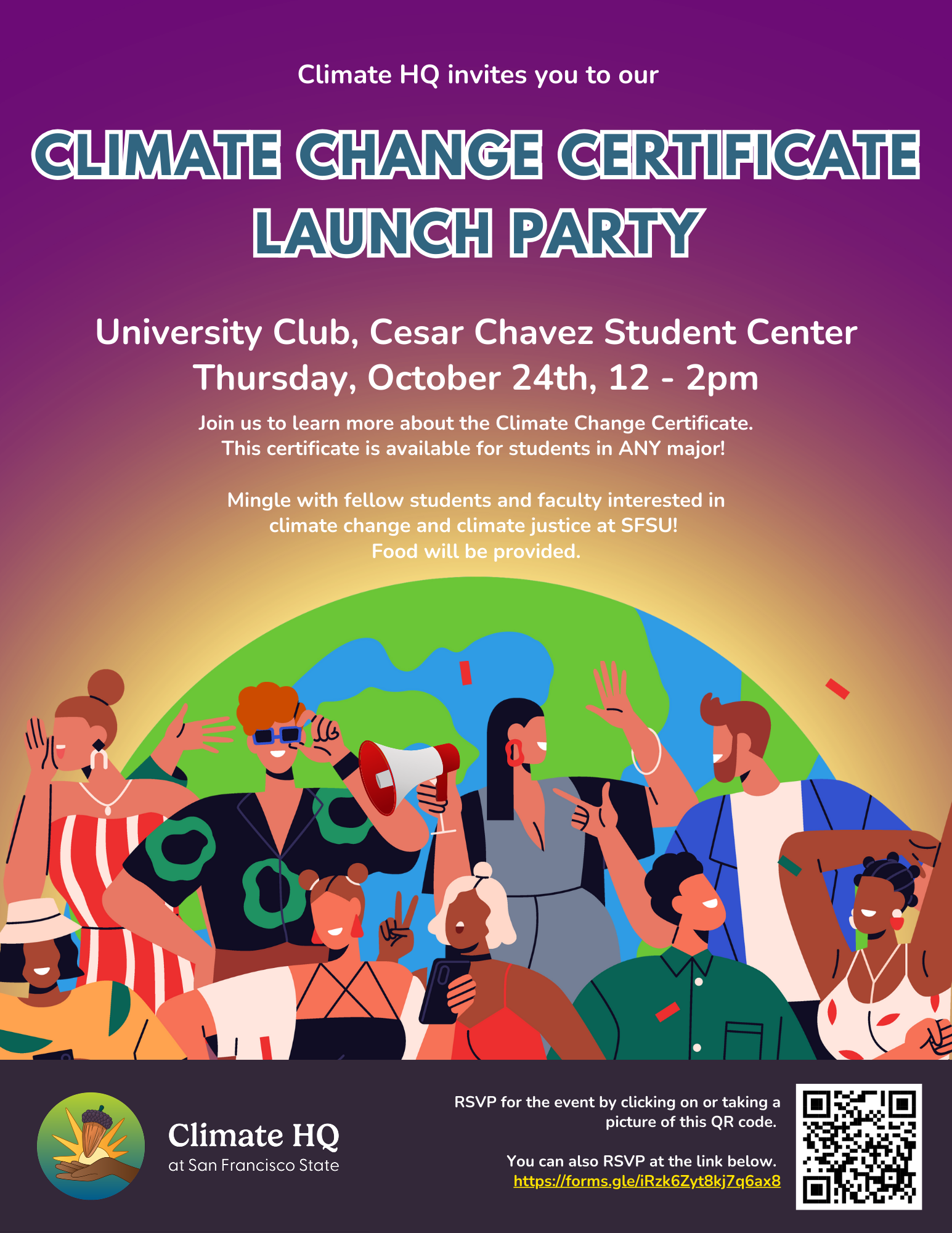News and Announcements

The SF State campus community gathered Thursday, Oct. 10, to celebrate the launch of the Oceania Scholars Program (OSP), a new Pacific Islander student support program. Launched this semester, the program focuses on the belonging, retention, graduation and success of Pacific Islander students at SF State.
OSP is a collaboration between the Critical Pacific Islands and Oceania Studies minor program, housed in the Race and Resistance Studies department and Asian American & Pacific Islander Student Services under the Division of Equity & Community Inclusion. The program was established after the two campus units collaborated to apply for a one-time $460,000 grant awarded by the California State University’s Chancellor’s Office.
“This is a vital new initiative aimed at centering the experiences of Pacific Islander students on our campus,” said Assistant Professor of Race and Resistance Studies Ponipate Rokolekutu, who is the lead principal investigator for this grant. “This program is more than just an academic initiative. It is a space where culture, identity and community come together to uplift our students and provide them with the tools and support they need to thrive.”
OSP is vital in addressing education equity for Pacific Islander students. It provides tailored support to help students overcome cultural and socioeconomic challenges and to enhance the inclusivity and visibility of Pacific Islander heritage and history on campus.
How OSP works
OSP establishes a central hub on campus where all students, particularly those from Pacific Islander communities, can visit to receive various student support services. That includes student success advising, social and emotional support, culturally relevant resources, campus resources and referrals, leadership development and more. The hub is currently in the Asian American and Pacific Islander Student Services office (Village C at Centennial Square, Room 141) but the goal is to eventually establish a permanent space.
Another important element of OSP is improving how Pacific Islander student data is gathered, maintained and analyzed to better serve this population. Pacific Islanders and Asian Americans are often grouped together in the U.S. For example, the term Asian American & Pacific Islander (AA&PI) is often used to describe the experiences of people from both populations. However, many scholars including OSP collaborators believe this coupling leads to inaccurate data collection that doesn’t accurately represent Pacific Islanders.
“The term Asian American & Pacific Islander can conceal the experiences and narratives of Pacific Islander students. Pacific Islanders are not a monolith, and Asian Americans are not a monolith,” Asian American and Pacific Islander Student Services Director Jeremy Khuth said. “Such broad terminology fails to account for the unique needs of each community, which is critical in providing targeted support for access and success in higher education and addressing belonging and equity.”
Also, many Pacific Islanders at SFSU identify as mixed-race, Rokolekutu explained. OSP aims to ensure students who identify as Pacific Islander and another race are captured accurately in Pacific Islander student data. The program also focuses on advocating for Pacific Islanders to be recognized as an underrepresented minority (URM).
“Disaggregation of data is essential for distinguishing the unique educational experiences and challenges faced by Pacific Islander students within the broader AANHPI umbrella,” Rokolekutu said. “This enables a more precise identification of their distinct needs, which is crucial for establishing their classification as a URM and advocating for the targeted resources and institutional support required to enhance their academic success, retention and engagement.”
OSP has also created leadership opportunities through five Navigator Student Assistant positions. These positions will allow students to conduct community outreach, organize events, give presentations and more regarding topics and resources geared toward Pacific Islander students.
“The Pacific Islander population is one of the fastest growing here in the United States, so we need the resources to be able to support the growing population of students that are entering higher education,” said Oceania Scholars Program Coordinator Tupou Latukefu, whose position is funded through the grant. "We are finally getting support on an institutional level but historically a lot of the work that has brought forth these new programs and resources have been fought for by Pacific Islander students.”

Week four of Cybersecurity Awareness Month is about staying updated and protected. One of the best ways to ensure all your devices remain safe and secure is by keeping their software and apps current. ITS recommends you apply an update to your device without delay as soon as one becomes available. These updates include patches that address any vulnerabilities where hackers can gain illegal access to your private information. That’s why staying up-to-date and always running on current versions is mission critical. Don’t sweat it: ITS has you covered with valuable tips on its website. Check them out!

Winter’s known for cold weather, but students don’t have to let their progress toward graduation freeze up. With SF State’s Winter Session 2025 they can earn up to four units taking undergraduate or graduate classes during winter break. Dozens of courses — many of them online — will be offered January 2 – 21, 2025, with the credit applicable toward an SF State degree. Registration begins Thursday, Nov. 1.
“Research shows that students who take longer to graduate are less likely to complete their degrees, so we’re dedicated to removing obstacles and creating clear pathways to graduation,” said Alex Hwu, dean of the College of Professional & Global Education. “Many of our courses are offered either online or in hybrid formats, with an accelerated schedule that allows students to finish a full semester’s work in just three weeks. That provides just the boost some students need to stay on track to graduation.”
Winter Session also offers extra flexibility to students by allowing them to use their spring financial aid to pay for Winter Session courses. Matriculated SF State students with sufficient financial aid can request a fee deferment. Students can get the details on the College of Professional & Global Education website.
Students can also RSVP for a free online information session Thursday, Oct. 24, or talk directly to Winter Session experts at a tabling event at Malcom X Plaza from 11 a.m. to 1 p.m. Monday, Nov. 4.
The results are in: You can now vote for your favorite design to finalize the winner for the SF State “I Voted” Sticker Design Contest! The most-voted option will be printed and distributed to all students who vote at the on-campus polls for the Nov. 5 election. Voting is open through Oct. 23. The winning option will be revealed on Oct. 25 on the Institute for Civic and Community Engagement’s Instagram page. Vote online.
Read more and find information on voter registration on the Gator Votes webpage.
Do you have an interest in incorporating climate change and/or climate justice into your pedagogy? Through SF State’s Climate Justice Leaders Initiative, Climate HQ aims to strengthen climate justice teaching, research and outreach at SF State.
Climate HQ supports climate justice teaching at SF State through Climate Justice Faculty Learning Communities. Modeled on Center for Equity and Excellence in Teaching and Learning’s Teaching Squares, these communities will meet regularly throughout the semester to support each other and share best practices for teaching and learning focused on climate justice pedagogies.
The Climate HQ Faculty Learning Communities will take place in the spring of 2025. Each should consist of three to six faculty, staff or students. Both interdisciplinary groups and people within departments/disciplines are encouraged to apply.
The communities should meet to work on their project for 10 hours over the course of the semester, using curated resources to create a proposed pedagogy outcome including but not limited to: syllabus change, readings list, assignment/exercise, lecture(s), project-based collaboration between departments, community collaboration and/or organization of a Climate HQ event for campus.
A $500 honorarium is provided. The deadline for applying is Wednesday, Nov. 20, at 5 p.m. View the call for proposals. For questions, please contact Carolina Prado.
The SF State Academic Senate met on Tuesday, Oct. 15, via Zoom. The senate:
- Presented an informational item on the new Time, Place, Manner Policy: A statement from the Academic Freedom Committee.
- Adopted by general consent the following proposals for substantive increase in units:
- Master of Arts in History
- Minor in Computer Science
- Passed San Francisco State University Resolution to Suspend Implementation of Interim CSU Time, Place and Manner Policy.
- Heard in first reading:
- Bachelor of Arts in Philosophy and Religion, program suspension
- Bachelor of Arts in Earth Science, program discontinuance
- Revision for S13-266 Academic Freedom Policy
- Assigned Time for Temporary Faculty Unit Employees Performing Institutional Service (new policy)
- Revision to S23-306 By-Laws for Departments, Equivalent Units, and All other Faculty Units that Offer Academic Degrees.
- Revision to S19-158 Hiring Policy for Tenure Track Faculty
- Revision to S22-298 Academic Integrity Policy
- Revision to S19-230 Grade Appeals Policy
- Heard presentations from:
- Senator Robert K. Collins and Senator Dipendra Sinha, “ASCSU Report”
- Alexander Dursin, Government and Community Relations Liaison, “Legislative Update”
The Division of Graduate Studies & Career Development (GSCD) is hosting its annual Grad Preview Week today through Friday, Oct. 25. GSCD asks faculty to encourage undergraduate students to explore SF State graduate education opportunities by joining one or more of over 60 virtual and in-person events. Staff are also encouraged to explore advanced degree or certificate opportunities.
As part of Grad Preview Week, the Division of Graduate Studies and Career Development will host a Graduate School Fair Tuesday, Oct. 22, 12 – 3 p.m. in Jack Adams Hall. Recruiters from various post-baccalaureate schools, including SF State, will attend this event to speak with interested students about their programs.
The University Budget Committee (UBC) invites campus employees to attend its next meeting on Thursday, Oct. 24, from 10 a.m. to noon via Zoom. Topics include an SF State student enrollment update, a CSU and campus budget update and answers to your questions about the University budget. Members of UBC represent staff, faculty, students and administrators. UBC information can be found on the Administration & Finance website. Additionally, UBC staff and faculty members also offer “Office Hours” the day after the meeting, to ask questions or share feedback with your peers about University budget-related matters. RSVP for the meeting and/or UBC Office Hours to ubc@sfsu.edu.
Climate HQ invites you to join them for their Certificate Launch Party Thursday, Oct. 24, from noon to 2 p.m. at the University Club in the Cesar Chavez Student Center. This event will highlight the Climate Certificate program, a certificate at SFSU available to students in all majors interested in learning more about climate change and climate justice, providing opportunities for students and faculty to connect and share insights on courses and projects. Network with like-minded peers, enjoy food and explore how you can be part of the climate action community at SF State. RSVP required — space is limited to 100 people!

Curious about generative AI, but not sure where to start? Join Academic Technology for a 60-minute hands-on workshop covering the essentials of generative AI chatbots like ChatGPT and Microsoft Copilot, including how to effectively and responsibly use them, and identify and discuss the best applications for your academic and administrative needs. Register for this workshop on the Academic Technology website.
The Lam Larsen Initiative for Emerging Technologies will present “Prompt Engineering for Business (Faculty Corner)” Friday, Oct. 25, at noon via Zoom. (Meeting ID: 825 6181 3214; Passcode: 552376) This presentation/workshop aims to provide the essentials of prompt engineering for faculty. In this presentation, Sam Gill, an emeritus professor of Information Systems at the Lam Family College of Business, will present how to construct prompts following some advanced prompting techniques that can be applied to any LLM (Large Language Model).
Gill has been programming and teaching computer technologies since 1961, starting with assembly language and tape-based operating systems for the Philco Transac 2000. Over his long career in academia and industry, he has participated in many computing technology developments and their application to the business world. Currently, his academic and consulting interests are focused on advancing the use of LLMS, Artificial Intelligence (AI), Machine Learning (ML) and Generative AI (GenAI) for business applications.
This event is open to all University faculty and students.
Student Health Services (SHS) is excited to announce its annual Halloween Open House, “Thriller,” on Wednesday, Oct. 30, from 11 a.m. to 3 p.m. Students are invited to explore various resource stations focusing on stress management, sexual health, basic needs and more, featuring numerous campus partners. SHS will be offering exciting and thrilling activities for our students, including free flu shots, snacks, raffles, giveaways and a Haunted Hallway! Entry is free.
Student Health Services is located between Ethnic Studies, Burk Hall and the Student Services Building. Come join them for this spooktacular event!
The Lam-Larsen Initiative for Emerging Technologies will present “Faculty Corner — Gaining Business Insights with Generative AI” on Friday, Nov. 1, at noon via Zoom. (Meeting ID: 810 1817 7641; Passcode: 602575) Generative AI is growing at a significant rate. The technologies and related investments are strong indicators of its pivotal role in the near future. Classic AI/ML (Machine Learning) techniques have given us insights into business processes through the window of analytics. Can the Gen AI approach give us deep insights into business, grounded in personalized, context-rich enterprise data? Beyond the chatbot, how do we build integrated applications for such an approach? This session hopes to provide some insights into these questions.
The presentation speaker is Sameer Verma, professor of Information Systems in the Lam Family College of Business. His current work is at the confluence of distributed infrastructure, edge computing and generative artificial intelligence in the context of information systems. He continues to derive inspiration from “Star Trek.” He still plays with Lego every chance he gets. He has much to learn from his two children.
A CalPERS retirement informational presentation will be offered on Tuesday, Nov. 5, for all CalPERS-eligible employees. This virtual, two+ hour session will be presented from 1 to 3:30 p.m. by Human Resources/CalPERS Retirement Specialist Mary Saw. RSVP via Qualtrics for the Zoom link.
Prospective students are invited to join one of two information sessions to learn about the Department of Child & Adolescent Development’s (CAD) undergraduate programs, opportunities for CAD students and admissions.
- Info Session 1: Thursday, Nov. 7, from 5 to 6 p.m.
- Info Session 2: Friday, Nov. 8, from 12 to 1 p.m.
RSVP via Qualtrics to receive a Zoom link for one of the sessions above.
On Thursday, Nov. 14, Risk and Safety Services (RSS) will host a discussion about holiday safety led by speakers from the Office of Emergency Services and Student Transitions. They encourage student organization leaders and students or faculty traveling by air for the holidays to attend. This will be in LIB 121 from 11:30 a.m. to 1:30 p.m. Snacks and drinks will be provided but attendees are encouraged to bring their lunch and eat during the presentation.
The Ready, Set, Safety! (RSS) talks at the SF State campus are collaborative meetings led by the Risk and Safety Services Division. These talks are designed to better inform the community of risk mitigation programs in place at SF State. Everyone is encouraged to attend and participate in these discussions as they offer an open forum for anyone interested in learning more about a variety of topics of interest.
SF State Spotlight
Latina/Latino Studies Professor Daisy Zamora, a contemporary Latin poet, has been inducted as a member of the North American Academy of the Spanish Language. The North American Academy of the Spanish Language is an organization comprised of writers, poets and educators with a mission to educate and encourage the proper use of Spanish in the U.S. It is part of the Association of Academies of the Spanish Language, affiliated to the Royal Academy of the Spanish Language founded in 1713 in Madrid, Spain. Subsequently, Academies of the Spanish Language were founded in other countries, which will accompany the Royal Academy and contribute their linguistic, lexicographical and grammatical concepts. During the 19th century, the Academies of Colombia, Ecuador, Mexico, El Salvador, Venezuela, Chile, Peru and Guatemala were founded. In the 20th century, the Academies of Costa Rica, the Philippines, Panama, Cuba, Paraguay, Bolivia, the Dominican Republic, Nicaragua, Argentina, Uruguay, Honduras, Puerto Rico and the North American Academy of the Spanish Language in the United States (founded in 1973) were created. The Royal Academy of the Spanish Language publishes the Dictionary of the Spanish Language, supported by the other Academies.
Zamora also wrote an introduction for “Songs of Cifar and the Sweet Sea” (Shearsman Books, London, 2024) by Nicaraguan poet Pablo Antonio Cuadra, translated into English by Adam Feinstein.
On Oct. 13, SF State Counseling faculty member Karla Castillo co-organized and participated in a group swim from the Golden Gate Bridge to Alcatraz. The purpose of the swim was to raise awareness for the Protect Sattitla project, which calls for protection of ancestral and sacred lands and waters of the Pit River and Modoc tribes in the areas of Shasta-Trinity, Modoc and Klamath National Forests. The tribes have been fighting for protections of the land and water for the last 20 years and are advocating for national monument status to ensure protections.
Castillo discussed the swim and project with Fox 2. “We usually do swims to raise scholarship dollars for undocumented students, and right now we’re doing it for a different cause, just to bring awareness to Sáttítla,” she said.
Alumni Nancy Jodaitis and Marcos Tapia also participated in the swim.
Each year voters are given the option to take an “I Voted” sticker after casting their votes. The origins of the sticker go back to the turn of the 20th century, but its popularity has only seemed to grow over the last few decades. Associate Professor of Political Science Rebecca Eissler recently discussed the history of the sticker with Teen Vogue.
During the 1980s, “[t]here were certain stores and businesses that would offer discounts to customers if they were wearing their ‘I Voted’ sticker,” said Eissler. In recent years, social media has contributed to the recognition the sticker is getting, making it an annual staple in voting in the U.S. “I think that little reward, that ability to feel proud, it probably helps people maintain the habit of voting,” Eissler said. “Once they’ve done it, they keep doing it in future elections because it feels good.”